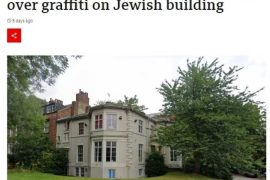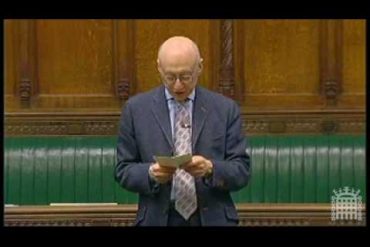A post by CAMERA Arabic
On the morning of September 11th, listeners to BBC World Service radio in Arabic heard a report from Ramallah by BBC Arabic correspondent Eman Eriqat which included the following: [emphasis and clarifications in brackets added]
“A vigil of solidarity was held in the heart of the city of Ramallah [on Saturday, September 10th], in demand for the necessary immediate release of ailing arrestee* [Arabic Mu’taqal, معتقل] Nasser Abu Hmaid, who faces a sentence of seven life imprisonments and additional 50 years. He has been arrested since 2002, and since August last year a tumour has been discovered in his lungs. As of the last two months he has not received any dose of [chemotherapy] treatment, a matter which the Detainee* [Arabic: Aseer, أسير] Club has confirmed, concerning arrestee Abu Humeid’s life possibly ending at any moment. This is why there are appeals, whether from his family or from Palestinian [human] rights [groups] or official ranks, for the necessity of his immediate release, at the very least so he would be among his family members in the event that he dies.”
In 2002 Naser Abu Hmaid was tried and sentenced to seven terms of life imprisonment and an additional 50 years for the murder of six Israeli civilians and a police officer and the attempted murders of 12 more people. Therefore he is a prisoner rather than a “detainee” or “arrestee” as claimed by the Ramallah correspondent (see translation remarks below).
According to Israeli NGO Almagor, as well as Israeli news website Channel7, Abu Hmaid confessed his deeds during his sentencing. He reportedly claimed that it was “the occupation” that drove him to dispatch members of the al-Aqsa Martyrs’ Brigades to carry out the four deadly attacks in which the following people were murdered:
Eliyahu Cohen, 29, of Modi’in, killed on the 443 highway in December 2000;
Binyamin Ze’ev Kahane, 34, and his wife Talia Kahane, 32, of Kfar Tapuach, killed near Ofra in December 2000;
Gad Rajwan, 34, of Jerusalem, killed in Jerusalem in February 2002;
Eli Dahan, 53, of Lod, Yosef Habi, 52, of Herzliyya, and Master Sergeant Saleem Barakat, 33, all killed in Tel Aviv in March 2002.
Abu Hmaid’s attacks and their death toll were completely omitted from BBC Arabic’s report. CAMERA Arabic has submitted a complaint to the BBC on that issue.
*The Arabic word Aseer (plural Asra) means “captive”. It could also be translated as “prisoner”, but (at least outside the Palestinian context) almost always within one of the three terms “political prisoner”, “prisoner of war” and “prisoner exchange”.
The Arabic word for a properly tried and sentenced prisoner is Sajeen (سجين) which is rarely used by Arabic media outlets when discussing Palestinians and Arabs in Israeli prisons, even if they are Israeli citizens. This applies to the vast majority of outlets, except some Western-oriented ones, including the BBC. The latter tends to use Sajeen more frequently, but never exclusively; alongside the occasional Aseer, Both Mu’taqal “arrestee” and simply Filastini (فلسطيني) “Palestinian” are also prominent.
However, since Asra is often translated into English by Palestinian officials as “detainees” in order to indicate that the Israeli authorities which tried and sentenced them are illegitimate, this is the translation we use here.
Update:
The BBC’s response to CAMERA Arabic’s complaint states:
“We accept that during the radio interview with BBC Arabic’s Ramallah correspondent Iman Ereikat on Sunday 11th September, she should have explained the background of Nasser Abu Hmeid and why he is serving a jail sentence. He should also have been referred to as a “prisoner” rather than “detainee”. This has been discussed with our correspondent in order to avoid these mistakes in the future.”





